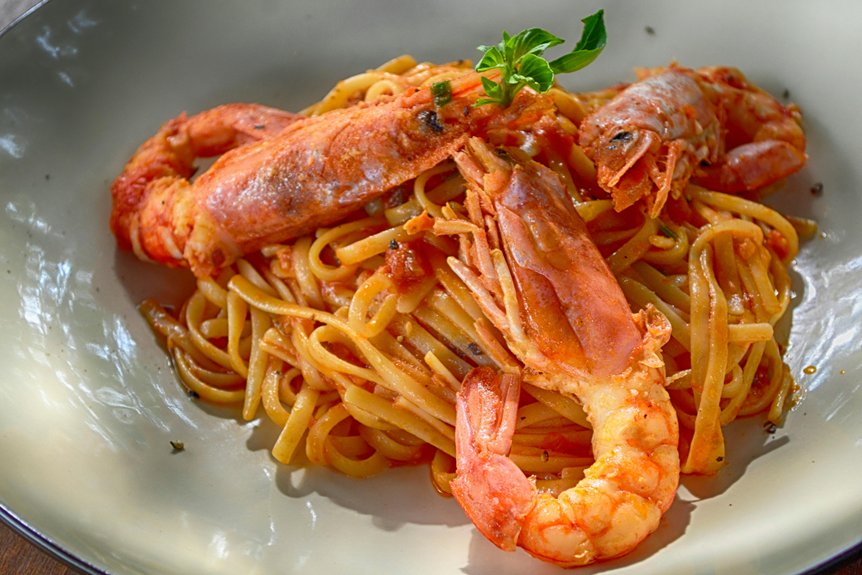
Cooking pasta is like crafting a beautiful piece of art; it requires precision and technique. If you’re aiming for that perfect al dente texture, you might wonder how olive oil fits into the equation. Adding it after boiling can elevate the dish’s flavor and prevent clumping. But is this method truly effective? Let’s explore the nuances of boiling pasta and the role olive oil plays in achieving that sought-after finish.
Understanding Al Dente: What Does It Mean?
When it comes to cooking pasta, understanding the term “al dente” is essential for achieving that perfect bite. This Italian phrase translates to “to the tooth,” meaning the pasta should be tender yet still firm when you bite into it. You don’t want it mushy; instead, you should feel a slight resistance. To achieve this, you should always check your pasta a minute or two before the package’s suggested cooking time. Remember, it continues to cook even after you drain it, so it’s better to undercook slightly. Once you get the hang of it, you’ll find that al dente pasta elevates your dishes, pairing beautifully with sauces and olive oil, creating a liberating culinary experience. Additionally, using high-quality olive oil, such as Gundry MD Olive Oil, can enhance both the flavor and health benefits of your pasta dish.
The Science Behind Cooking Pasta
Cooking pasta isn’t just about boiling water and waiting for the timer to go off; it’s a fascinating interplay of chemistry and technique. When you understand the science, you’ll elevate your pasta game. Here’s what happens:
- Starch Gelatinization: As pasta cooks, starches absorb water and swell, creating that desirable texture.
- Protein Denaturation: Heat causes proteins in the pasta to unfold, contributing to its structure.
- Water Absorption: Pasta takes in water, which softens it while cooking.
- Al Dente Formation: Timing is essential; undercooking allows that perfect bite while retaining structure.
The Role of Salt in Pasta Cooking
Although you might think of salt as just a seasoning, it plays an essential role in pasta cooking that goes beyond flavor enhancement. When you add salt to boiling water, it increases the water’s boiling point, allowing the pasta to cook evenly and efficiently. This helps you achieve that perfect al dente texture. Additionally, salting the water guarantees the pasta absorbs some flavor during cooking, making each bite more satisfying. Aim for about one to two tablespoons of salt per gallon of water—don’t worry, most of it won’t stick to the pasta. Remember, seasoning your water is like setting the foundation for a delicious meal. So, embrace this simple step in your pasta cooking journey for a more liberated culinary experience!
Exploring the Benefits of Olive Oil
While olive oil might seem like just an optional addition to your pasta, it actually brings a range of benefits that can elevate your dish. Here’s why you should consider it:
- Flavor Enhancement: Olive oil adds a rich, fruity taste that complements various sauces.
- Health Benefits: Packed with antioxidants and healthy fats, it supports heart health and boosts your immune system.
- Texture Improvement: It helps create a silky, smooth finish, making every bite more enjoyable.
- Preventing Sticking: Mixing olive oil with pasta helps keep it from clumping together, ensuring a perfect al dente texture.
The Technique: Boiling and Mixing With Olive Oil
To achieve perfectly cooked pasta infused with the delightful essence of olive oil, start by bringing a large pot of salted water to a rolling boil. Once the water’s bubbling, add your pasta and stir occasionally to prevent sticking. Cook it until it’s just shy of al dente—this means it’ll have a slight bite to it, perfect for absorbing flavors. When it’s ready, reserve a cup of pasta water and drain the rest. In a large bowl, combine the hot pasta with a generous drizzle of high-quality olive oil. The heat will help the oil coat the pasta evenly, creating a luscious finish. Toss it well, adding reserved pasta water as needed to achieve your desired consistency. Enjoy your masterpiece!
Flavor Enhancement: Does Olive Oil Make a Difference?
How does olive oil elevate the flavor of your pasta dish? It’s all about the richness and depth that a good olive oil brings. When you mix it into your pasta, you’re not just adding fat; you’re transforming the whole experience. Here’s how:
- Adds richness: The smooth texture enhances each bite, making it more satisfying.
- Enhances aroma: The fragrant compounds in olive oil awaken your senses, enticing you to dig in.
- Balances flavors: It acts as a bridge, uniting spices and herbs for a harmonious taste.
- Boosts nutrition: Extra virgin olive oil is packed with healthy fats and antioxidants, enriching your meal.
Common Mistakes to Avoid When Cooking Pasta
When you’re cooking pasta, it’s easy to make a few slip-ups that can ruin your dish. One common mistake is not salting your water adequately. A generous pinch of salt enhances the pasta’s flavor, so don’t skip it! Another error is adding oil to the boiling water; this can prevent sauce from sticking later. Keep an eye on the cooking time; overcooking leads to mushy pasta, while undercooking can ruin your meal. Always taste your pasta a minute or two before the package suggests. Finally, don’t rinse your pasta after draining; it washes away the starch that helps sauces adhere. By avoiding these pitfalls, you’ll elevate your pasta game and enjoy a liberating culinary experience!
Alternative Methods for Achieving Al Dente
Achieving the perfect al dente pasta can be done through various alternative methods that guarantee your noodles maintain that delightful bite. Here are four effective techniques you can try:
- Soaking Method: Soak your pasta in cold water for a few hours, then cook briefly in boiling water. This hydrates the noodles without overcooking them.
- Stovetop Absorption: Use less water than usual and let the pasta absorb it, stirring occasionally. This technique promotes even cooking and a firmer texture.
- Steam Cooking: Steam your pasta instead of boiling it. This method prevents overcooking while ensuring a chewy consistency.
- Pasta Salad Technique: Cook the pasta al dente, then rinse it under cold water. This halts the cooking process and keeps your noodles firm.
Experiment with these methods and liberate your pasta game!
Final Thoughts on Pasta Preparation Techniques
While there are countless techniques for preparing pasta, the key to mastering your dish lies in understanding how each method affects texture and flavor. Experimenting with boiling, sautéing, or even baking can lead to delightful variations. When boiling, remember to salt your water generously; it enhances the pasta’s natural taste. If you prefer al dente, time your cooking carefully, testing a minute or two before the package instructions suggest. Mixing cooked pasta with olive oil not only adds richness but also prevents sticking. Don’t shy away from incorporating your favorite ingredients, whether it’s fresh herbs or spices. Liberation in cooking comes from your willingness to try new approaches and refine your process, creating a pasta dish that’s uniquely yours.





